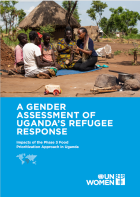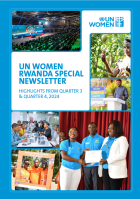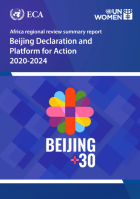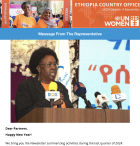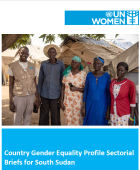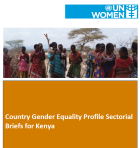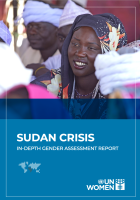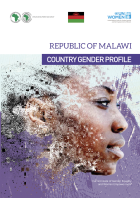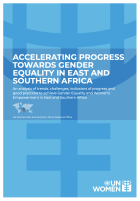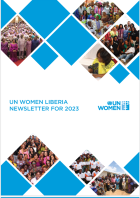1 - 20 of 73 Results
Pagination
Date:
Uganda’s refugee policy is progressive, yet women and children remain highly vulnerable. Since 2022, food aid cuts have severely impacted female headed households. A gender assessment across eight districts highlights these challenges, showing the disproportionate effects on livelihoods, education, and protection. Key recommendations include promoting alternative livelihoods, improving education access, strengthening GBV support, enhancing food security measures, and fostering peaceful coexistence with host communities to ensure sustainable empowerment and gender-responsive aid.
Date:
This newsletter highlights some of UN Women`s key milestones made in advancing gender equality and women`s empowerment in Rwanda in the period of July - December 2024
Date:
The message that "Women’s rights are human rights" was strongly affirmed in the 1995 Beijing Declaration and Platform for Action (BPfA). Serving as a roadmap, the BPfA outlined clear objectives to tackle 12 critical issues impacting women and girls, including education, health, economic empowerment, political participation, and human rights. As the world marks the 30th anniversary of the BPfA in 2025, it serves as a solemn reminder that, despite progress, we are still far from fully achieving its goals.
Date:
Happy New Year!
We bring you the Newsletter summarizing activities during the last quarter of 2024. As we gear towards continuing our work of empowering women and girls with a renewedspirit for 2025, we reflect on how 2024 has been for GEWE work. At UN Women EthiopiaCountry Office, we concluded the year with a vibrant commemoration of 16 Days of activism.The annual Unite Campaign brought together government entities, sister UN Agencies, CSO,Women Led organizations among others. It was yet another opportunity to collaborate andrenew commitment to work for betterment of the lives of women and girls in Ethiopia.
Date:
While progress has been made in gender equality policies and peacebuilding, women face structural barriers. The study recommends strengthening legal frameworks, institutional structures, and socio-economic initiatives, urging collaboration among government, UN agencies, civil society, and partners to advance gender equality and women’s empowerment.
Date:
These policy briefs, form part of the Country Gender Equality Profile (CGEP), evaluates gender equality in Kenya, offering evidence-based insights for stakeholders to advance commitments to Gender Equality and Women’s Empowerment (GEWE). Guided by the EU Gender Action Plan 2021–2025, they promote inclusive, transformative approaches to inform programmes, policies, and actions, addressing diverse gender needs and advancing Kenya’s Sustainable Development Goals (SDGs) through national and county-level collaboration.
Date:
This report provides recommendations to ensure future elections are conducted in a gender responsive environment. Some of the recommendations include alignment of the Electoral Act to the Constitution, amendment of the Political Parties Finance Act to provide a framework that encourages participation of women through financial support to female candidates, reduction of nomination fees, as well as the need to provide proper sanitation and living conditions of electoral staff among others.
Date:
Generation Equality is a global initiative that aims to drive change through a multigenerational and multi-stakeholder approach, focusing on key issues like equal pay, fair distribution of unpaid care work, eradicating gender-based violence, healthcare access, and increasing women’s political participation.
Date:
This manual has been designed for women leaders within grassroots networks throughout Somalia and in the federal member states. It will support women leaders’ capacity to engage with the Transformative Leadership for Women’s Rights principles, empowerment, peace and participation.
Date:
This report seeks to promote the inclusion of women in leadership roles within the peacebuilding process, realize women’s potential as peacebuilders to contribute to reconciliation, conflict prevention, and develop stronger infrastructures for peacebuilding in Somalia.
Date:
UN Women has been partnering and working closely with Amhara Bureau of Women, Children and Social Affairs (BoWCSA) to increase women’s effective participation and equal representation in leadership through the “Enhancing Women’s Leadership and Empowerment Project” since 2017 by employing multipronged strategies. Among the strategies, capacity development programme on Transformative Leadership for Gender Equality for women leaders coupled with mentorship support have been employed since the start of the project. So far, UN Women in collaboration with Amhara BoWCSA built the capacity of more than 1300 women leaders. It also linked 109 mentees with 109 mentors through one-to-one mentorship approach. In addition, women leaders’ networking platforms were established at regional, zonal and woreda levels to increase the voice and leadership of women leaders in Amhara region. These interventions boosted the confidence of women leaders to aspire for higher leadership positions as well as promoted gender responsiveness in their respective positions.
Date:
The Women Parliamentary Strategic Plan (2023-2027) is the result of thorough analysis of the achievements, challenges, and lessons learned from the WPC Strategic Plan (2018-2022). It reflects the expectations of the South Sudan National Legislature, constituents, and the people of South Sudan. This Strategic Plan signifies WPC’s commitment to service delivery standards for stakeholders. The WPC aims to enhance visibility by recruiting a consultant to support WPC members and on the implementation of the new SP.
Date:
This publication aims to identify the existing gender gaps in legal frameworks and policies to enable the integration of gender issues to increase the leadership roles of women and women with disabilities in local decision-making and ensure that they are equal beneficiaries of development interventions.
Date:
The main purpose of this publication is to establish baseline findings that will be used to guide the design and refinement of evidence-based project strategies and approaches to be applied in the Women’s Leadership and Economic Rights (WLER) Project.
Date:
This brief emerges from the Assessment of Women's Movement in Africa, and it shows that African states and public institutions are – as a result of the efforts of the women’s movement – increasingly becoming gendered, and a greater number of women are making inroads into the continent’s corridors of power.
Date:
The assessment utilized the gender inequality framework used in humanitarian settings. The framework considered how the gender inequalities prevalent in pre-conflict contexts are exacerbated by conflict dynamics and how the impact differs with different gender roles. The framework indicates that the humanitarian responses should consider the basic livelihood needs and investigate and address some strategic issues that promote
Date:
The publication takes stock of current programme achievements, challenges, and opportunities.
Date:
The Malawi Counrty Gender Profile publication presents a review of existing gender issues identified through a review of documents and reports recently released. The generic purpose of Country Gender Profile is to strengthen national understanding and data on the advancement of international, regional and national commitments towards Gender Equality and Women's Empowerment.
Date:
The Report highlights the imperative and urgent need to have men, along with women, become gender equality activists and work towards violence-free, inclusive societies. An important reflection on masculinity sheds light on how toxic masculinity models not only harm women and girls, but the majority of men and boys too. In this regard, gender equality really matters for both men and women, and requires both to join their efforts to realize it.
Date:
The newsletter highlights UN Women Liberia’s contribution to promoting gender equality and the empowerment of women in the last quarter of 2022 and the first quarter of 2023. The newsletter is intended to give readers a broad insight into UN Women’s collaborations, achievements and impact in Liberia.

